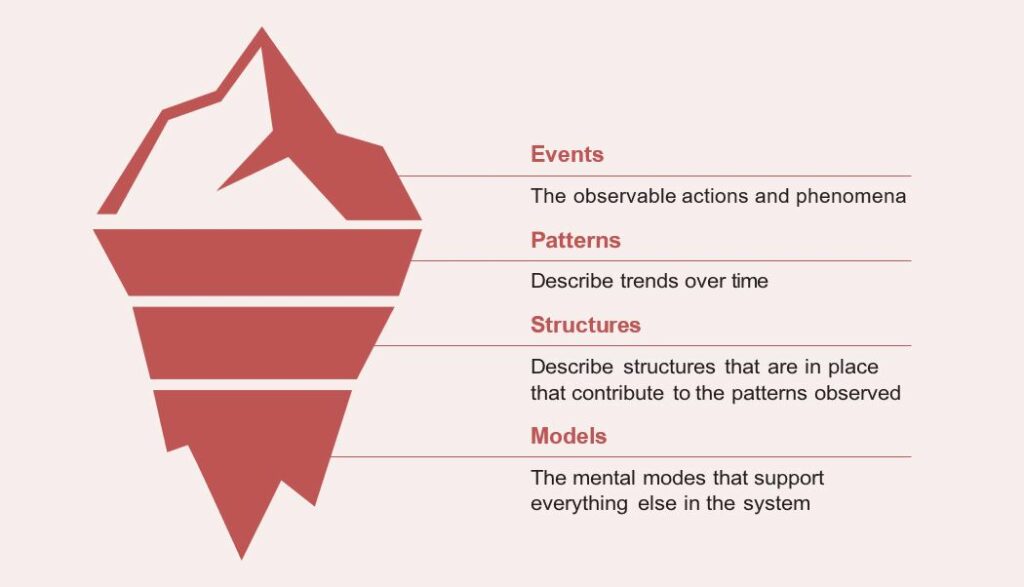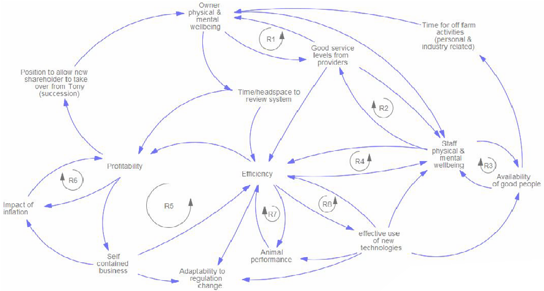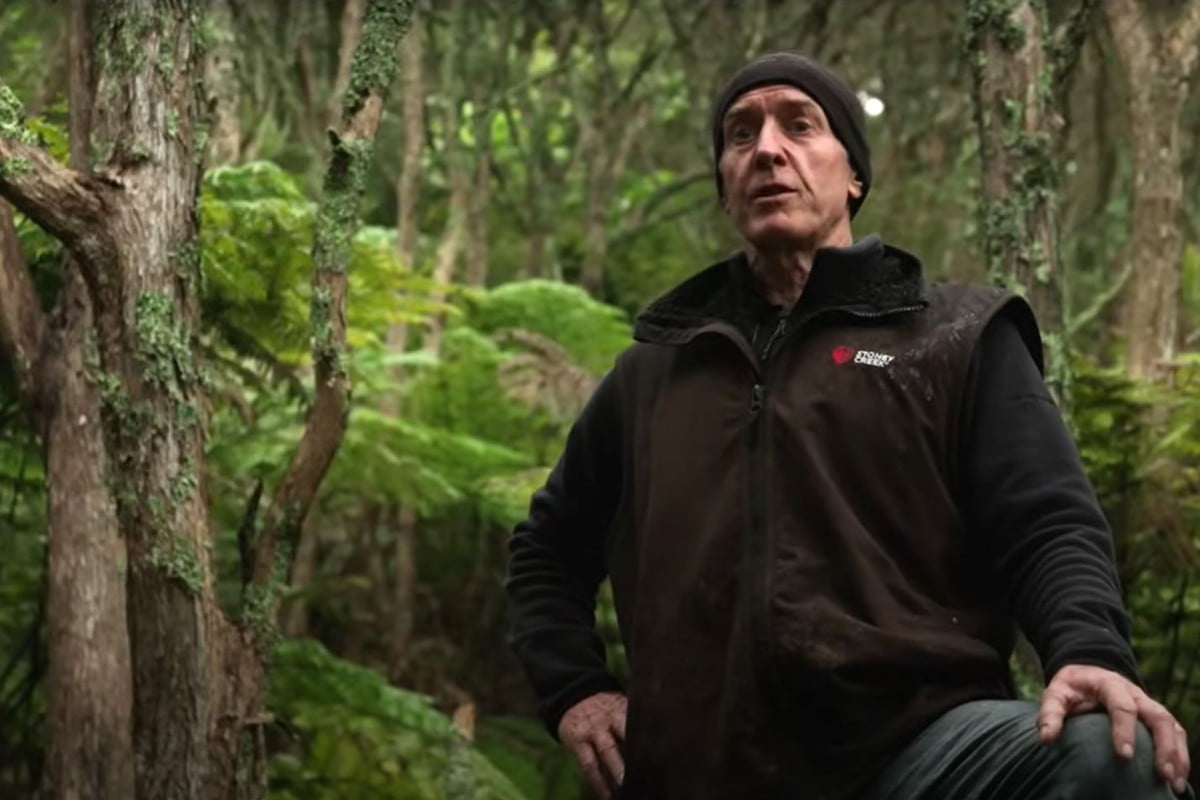Seeing the Big Picture
A replicable workshop has supported farmers and rural professionals to think in systems.
Richard Wright’s farming business has a lot of moving parts: beef, dairy, cropping, a pasture- to-plate meat brand, honey ventures and native restoration, to name a few. Behind it all is his team, with community, catchment groups and council to also factor in. Don’t forget the mega-trends either – staying up to date with climate change, markets and technology.
“To do well, we’re expected to know everything about everything – or at least to be a jack of all these trades,” says Wright. “Unsurprisingly this means we spend time learning and doing things that sometimes just aren’t that useful in the long run.
“We have limited time and what seems like an increasing list of things we could be doing. So, when we’re looking at a problem, I want us to be looking for the root cause. When we’re thinking about investing time and money, that action needs to drive real impact for us.”
Six months after a facilitated workshop applying systems-thinking principles to his farming business, Wright points to both intangible and tangible outcomes.
We’ve also stepped up our local catchment work and focus on irrigation – that’s the point in the wider system we think will drive the most positive change for us going forward
“It’s hard to draw a straight line with these things, but I think we’re looking at problems a bit differently now. The systems-thinking tools were a good way to engage the team – to get them sharing perspectives and talking about impactful actions. We’ve also stepped up our local catchment work and focus on irrigation – that’s the point in the wider system we think will drive the most positive change for us going forward,” he says.
Like Richard Wright, many farmers are finding that challenges to the farming system – be it weather, market, people, regulations, or others – are coming at them faster, with more force and at greater frequency.
To respond, they are being told to think and act more ‘holistically’ and move from ‘quick fixes’ to more long-term solutions, but without any training or support to help them sift through the mountains of information available and identify what ‘holistic’ action looks like on their farm or in their community.
Leverage points
Systems thinking shows promise as a method where farmers like Richard Wright can step back and see their system as a whole. By taking time to find patterns and consider the relationships between factors on the farm (like people, environment, regulations and profitability), farmers will be better able to identify ‘leverage points’ – actions that have the most positive impact in the system.
A systems-thinking workshop process was designed for farmers and rural professionals by Agri Magic and collaborators, as part of a Rural Professionals Fund project funded by Our Land and Water.
Example leverage points discovered through the process included changing team roles, upskilling people, working more with others or finding new technology. Overall, systems-thinking principles and tools were found to offer farmers a way to step-up from ‘quick fix’ thinking, enabling them to focus on redesigning critical parts of their farming system to be more fit-for-purpose for the future.
Systems thinking for future farm design
Why: To help farmers develop a whole-of-farm perspective, explore how different parts of their system are connected, and identify their most effective options for positive change.
Where: Two strategic workshops between leading Canterbury farmers and their advisory teams.
What:
- A strategic workshop process tested the use of systems-thinking principles and two tools, for rural professionals and their farmer clients to use together.
- Results from two test workshops showed that a systems-thinking approach is a good fit for farming challenges.
- The process created a constructive space for rural professionals and farmers to raise confronting questions and share challenging perspectives. The process removed emotion and reduced reflexive pushback, leading to wider discussion and new insights.
- Farmers left the workshop with fresh perspectives on their underlying worldview, and identifiable actions they felt could deliver system-wide change (as opposed to ‘quick fixes’). These included changing organisational structure and better integration of technology into the system to enable more transparency.
- Systems-thinking principles were reviewed through a mātauranga Māori lens, which suggested that both bodies of knowledge share underlying principles around identifying relationships between factors and prioritising holistic solutions.
The workshop design
To enable farmers to take a systems-thinking approach to their farming business, the project team designed a series of workshops that were held between Richard Wright and another Canterbury farmer, alongside their rural professional advisors. The first, a strategic workshop, covered three parts:
1. Setting the scene. A brief overview of systems thinking.
2. The Iceberg Model, a systems-thinking tool. Like an iceberg, a large part of what is occurring in a farmer’s world is hidden from view. The tool focused on moving through four layers (see Figure 1), reflecting and discussing how each layer might be influencing any individual event. The Iceberg Model helps make underlying assumptions visible, opening up questions about how this or that worldview shapes their farm systems. Critically, it also creates space to hear other perspectives that may challenge these assumptions. One example in the workshop included:
- Event: A new winter grazing requirement.
- Patterns: ‘Regulations are intensifying’, ‘dairy support requirements are increasing’, ‘water quality is declining’, ‘extreme weather is increasing’.
- Structures: Consents, grazing plans, irrigation schemes, standard operating procedures, catchments, councils, tikanga and protocols.
- Models (or worldview): ‘Farmers can make big differences’, ‘does council want to control or collaborate with farmers?’, ‘is winter cropping bad for the environment?’, ‘do we need to shift our diets?’.
Here, farmers were invited to physically draw the patterns of factors influencing the events (patterns of behaviour over time). By creating a visual representation of the complexity of their farming systems, the team were able to step back and start to see the general areas where leverage points might be found.
The Iceberg Model was then used for a second time, with the farmer moving upwards from the worldview, through structures and patterns to events. In this task, farmers were asked to consider what a future worldview of theirs might be, and how that might influence the layers differently and result in different events. In this way, one farmer recognised that their own current worldview around technology could be limiting their ability to provide more automation for their staff and transparency across the business. As a result of this insight, the team considered designing a plan to support future technology adoption in the business.

3. The causal loop diagram. A causal loop diagram is a map of a system, making relationships between factors clear and enabling farmers and rural professional teams to identify leverage points (see Figure 2). By taking time to map out the wide range of natural, human, technological, business and other factors in running a resilient farming business, and noting down how each might affect the other, leverage points within the system started to appear. In one example, ‘operational management controls’ quickly stood out as a central part of the system – changes here would have the greatest ripple effect across the other factors.

Better relationships and open dialogue
Project co-lead Anna Higginson, an Agri Magic senior consultant, points out that “the real gold is within the conversations – this ability to step back, look at issues with fresh eyes and maybe develop a new mindset that could shape decisions going forward.”
While the outputs of the workshop (particularly the causal loop diagram) outlined some tactical, everyday changes the farmers could implement, the farmer’s ability to look at problems from a fresh, systemic perspective was the key outcome.
The project leaders found that the facilitated strategy session was an effective way to capture ideas and provoke discussion. The process was not necessarily about fundamentally redesigning farming systems. Rather, it was a starting point where worldviews and assumptions could be questioned, gaps identified and leverage points considered.
One of most impactful aspects of the workshop process was the ability for farmers and their rural professionals to ask hard questions of each other. Coming into the workshop, one farmer noted that advisors tend to shy away from asking difficult questions of their clients – meaning the opportunities that come from challenging debate can be missed. This wasn’t the case on the day. The framework helped to remove much of the emotion and bias often associated with controversial issues. Indeed, taking the opposing view was an important part of the exercise.
Notably, both farmers went on to use the Iceberg Model with their farm teams in the hope that this non-confrontational approach would enable better perspective sharing across their teams.
Mātauranga Māori
The principles of systems thinking were also reviewed through a te ao Māori lens. The principles
of mātauranga Māori were found to align well with systems-thinking frameworks. The two approaches share a holistic perspective: that no individual or system exists in isolation; and that recognising the intricacies of the connections that make up the whole results in lasting, positive action.
This part of the research has gone on to inform a Masters’ research project, and has implications for how future workshops may be redesigned to better reflect systems thinking in our cultural context.
Setting up for success
While the project clearly identified that systems thinking in general is a good fit for farming challenges, and that a facilitated strategy session enabling farmers to take a whole-of-system approach was valuable, there are several prerequisites that set the workshop up for success. These include:
- Training in systems thinking on the part of the rural professional.
- A trusted client-advisor relationship – knowledge of the farming business and existing rapport.
- Knowledge of challenges outside the farm gate – a broad understanding of the modern farming landscape by both parties leads to more compelling insights.
- Facilitation skills – careful preparation, the right framing, creating a space for constructive dialogue, asking thought-provoking questions, and actively listening and managing group dynamics are all critical to the workshop.
- Mātauranga Māori – an understanding of these principles helps to explore the cultural context of the farming business. Taking a te ao Māori view enables farmers and rural professionals to better understand their Resource Management Act obligations grounded in the principles of Te Tiriti o Waitangi – and how better engagement with local iwi, hapu and whanau might help to meet these. Understanding their environmental values and practices through the lens of kaitiakitanga (guardianship) may also provide a rich new worldview for farmers and rural professionals, enabling them to value these differently in a farming system or connect with like-minded others in their community.
Where to from here?
Farmers who are interested in exploring a systems-thinking approach to their farming problems should inform their rural professional about this research. For rural professionals looking to better support their farmer clients to manage the myriad of challenges facing their business, this replicable workshop offers a fresh, fit-for-purpose framework.
This article was first published in New Ground magazine, issue 3. All text is licensed for re-use under Creative Commons Attribution 4.0 International (CC BY 4.0)
Author
 View Our Strategy Document 2019 – 2024
View Our Strategy Document 2019 – 2024




Leave a Reply